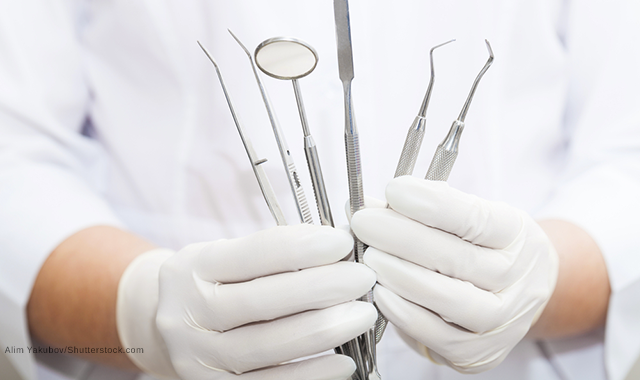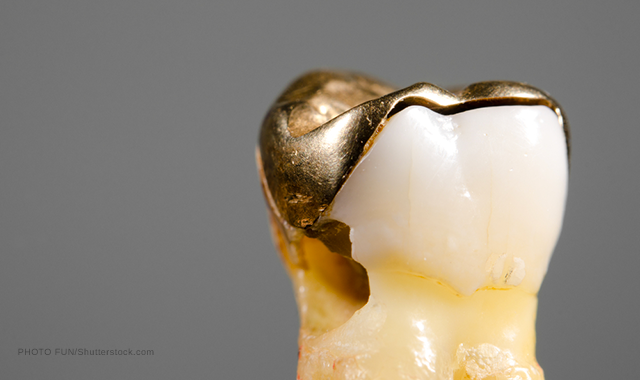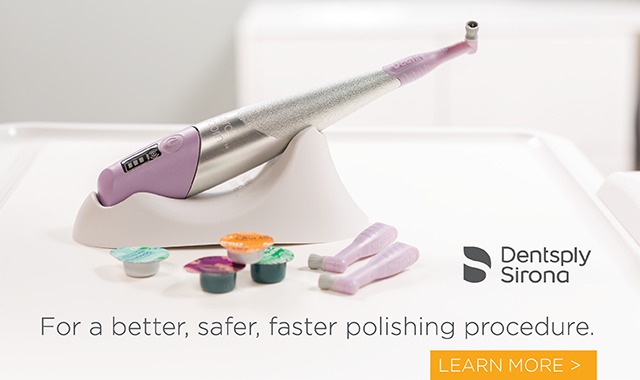5 interesting questions hygienists asked Kara RDH in February
As the founder of dentalhygieneanswers.com, Kara Vavrosky has heard a lot of questions this month. Here are some more of the ones that stuck out the most to her.
As a well-known and accomplished dental hygienist, Kara Vavrosky often gets asked for advice.

She runs the popular Facebook page Dental Hygiene with Kara RDH and is also the founder of dentalhygieneanswers.com, a question-and-answer platform for dental hygienists.
Here, Vavrosky shares five more interesting questions she's been asked recently, along with her answers.
This month, readers had questions about irritating coworkers, concerns about anesthesia, worries about mistakes and more!
Continue to the next page to see the questions.


Scaling tips
I’m a newer hygienist, less than two years. I’ve always felt that I’m good with scaling. Recently, I’ve been told that I’ve been missing things and I’ve been taking it hard. Any tips?
Even though we try, we are only human and cannot be perfect 100 percent of the time, so don’t get down on yourself! Go back to the basics; slow down and assess your fulcrum and your adaptation. While adaptation and correct fulcrum is key, if this is a recent issue, it may not be something you are necessarily doing wrong. When was the last time you sharpened or replaced your instruments? Depending on how many setups you have, difficulty of patients, how often the instruments are used, etc. the issue may be the quality of your instruments. Instruments need to be replaced about every nine to 18 months. They simply don’t last forever. Same goes for ultrasonic inserts. Keep the card that comes with your inserts to measure if they are worn out. Don’t hesitate to blow air and explore after scaling too. Loupes and a light can make a big difference as well.
There’s a big difference between constructive criticism and just criticism, so whoever is telling you that you are missing things needs to tell you exactly where, to make it purposeful. Maybe you are only missing calculus on the distal of tooth 29. Knowing specifics can give you a baseline of where you need to really focus and work on your technique.
The fact that you are asking for help tells me that you are really trying to do your best. I applaud you for that! Every day, even year after year, you will get better and will continue to learn new things. Be patient with yourself! You are a trained professional who passed boards, so you know what you are doing. Even 30-year veterans miss calculus!



Hours changing constantly, I’m burnt out. Help!
I’ve been working for three months and my schedule has been changed four times. It has just been changed due to significant staff turnover (more than six hygienists gone in one year and lots of DAs). I’m stressed out to the point of crying daily after work and upset stomach daily. I cannot live my life like this. First, I was given a set schedule that worked well for me and my family, then told a month later I would be Monday-Thursday, then I was told I would work every day with short shifts (including Saturdays). Then presented with longer shifts daily.
Finally, I was given a schedule of working Monday, Tuesday, Thursday, Friday and every other Saturday. Just weird shifts. I need something permanent. Also, I now have two patients per hour with someone helping me with X-rays and polish, that’s it. They do not help with exams, scheduling or anything else. Also, I treatment plan/present and go over finances. I feel like I’m being treated as if I’m a machine and not a human. I have written a two-page paper on my job description and what needs to change for me to stay here to present to the OM. I’m very overwhelmed. I loved hygiene when I first started and now I’m unhappy. What do I do?
Also, I have applied for other jobs in my area. I have had two offers that were too far of a drive realistically. I have since applied for more, however I am literally afraid of a new office being worse than my current situation. Is this how hygiene is? Do you work when they tell you to and be happy doing so?
I feel your pain! My first permanent job out of hygiene school sounds much like this, including the 30-minute appointments. I was promised an assistant, however no assistant was ever available to help. It wore me down physically and mentally. I even began to resent my career choice. I cried more working there than I ever did in hygiene school, if you can believe that! So I know how horrible this is for you. Don’t be afraid of a new office being worse than your current situation. You must move on as soon as you can. Change is always scary, but when you are feeling as bad as you are, including being physically sick, you must change your situation. Even if you have to commute a bit farther than you’d like, it’s better than what you are going through now.
As hygienists, if we allow ourselves to be treated this way, nothing in our field will ever change. While the note to the OM is a good idea, I have a feeling it won’t change anything. The turnover rate proves that unfortunately. It may give you piece of mind though knowing you’ve given them the reason why they are not the best employer and their turnover is so high. Sometimes piece of mind is worth it! Even with many sit downs with the doctor (and office manager) I worked for, the doctor would not budge in his ways. I made looking for another job like having a second job. When I went in to work I told myself, “This is only temporary,” to get through the day. Every day I applied for any jobs that came up. I’m not going to lie, it took a while, but one finally did come. Like you, I was terrified a new office would be bad too. But if it was bad, I already had my resume updated so to keep on looking wasn’t that horrible of a deal as long as I was out of that initial office, because nothing could have been as bad as that office! So again, I suggest the same thing to you; you need to make a change. You are being treated unfairly, without respect and are not able to provide patients with the quality of care they deserve. And why in the heck are you having to do the front desk/office manager’s job on top of treating patients?! In my experience, blurring those roles isn’t the best business practice, especially if you aren’t given adequate time to do it.
Not all offices are like this – a better workplace is out there! I truly feel for you and it hurts my heart you are going through this. Keep your chin up and remember why you love hygiene. I wish the best of luck to you!



Treating patients who are sick
If a patient comes in and says he or she is sick, or you can tell he or she is sick, do you treat him or her or reschedule?
I normally steer clear of saying, “In hygiene school, I learned…” because with research, protocols change. However, I’m going to break my rule. In hygiene school I was taught that for elective dental procedures it’s best to reschedule if a patient is sick. I still believe this to be true. This is not only for the comfort of the patient and to keep the staff from becoming sick, but mostly for the other patients that have appointments. Yes, we wear masks and other PPE, but that’s only in the operatory. That doesn’t protect our other patients from what the sick patient has touched in the reception area or the aerosols that can remain in the air for hours, if not days, in our operatories. Of course, there are air quality and filtration standards for dental offices, but not all offices comply.
I feel strongly about rescheduling because of the amount of medically compromised patients, especially the frail, elderly patients and organ transplant patients I have seen (and probably you too), that if exposed to infection can be life-threatening to them. One of my first patients I saw in hygiene school, who became one of my favorite patients, was a liver transplant recipient. So I may have an overly protective, soft spot about this. I also have a family member and a family friend who are organ transplant recipients. They make special efforts to stay out of contact with anyone who’s sick and large crowds to keep from being exposed because they are on anti-rejection meds that lower their immunity. When they go to their dental appointment, they expect it to be a safe place for them, without worrying a sick person was seen before them, leaving them exposed. This may sound over the top, but for them it’s a big deal. I feel we should respect that because we do have the ability to keep them safe.
Some offices are very good about this, especially when confirming appointments. If the patient sounds sick, they are rescheduled then. However, some offices care more about the bottom line (money) and don’t share my philosophy. An office should come up with a protocol that everyone follows to protect staff members and patients alike. Overall, I feel it’s best to reschedule a sick patient if possible.


ADVERTISEMENT



Confronting the doctor on poor work quality
In the last six months, we hygienists have been finding decay under fillings done less than a year ago. There was also a case where the fillings were done but comparing the old bitewings to the new ones, the doctor completely missed the decay. Our doctor has been practicing for more than eight years so we can’t say this is anything to do with being new. We have set up a time to have a meeting to discuss this with him, but none of us know how to bring it up.
How do you tell your boss that he isn’t doing quality work? He also doesn’t have good chair side manner. He is very sarcastic and rude. We have lost some patients due to his behavior and we are worried that we will lose more with the trouble we are having now with the poor fillings. It’s getting to the point where none of us want to refer family or friends to our office.
This is a tough one! I applaud you for taking the first step and setting up a meeting with the doctor. No dental professional is perfect, which is why we “practice” dentistry. However, if there’s been a recent, noticeable change in the quality of work by your doctor, it’s worth making sure everything is okay with him.
To begin with, identify what drives your doctor. For example, if he talks about quality patient care, impressing others or if he has a focus on production, let this guide your conversation. Speak to him in a way that he can identify with; adapt to him. This is how to make the conversation stick. Put yourself in his shoes and think of how he needs to hear your concerns to understand. Before speaking to him, anticipate the doctor’s “comebacks.” If you think you know what he is going to say, truly think out what you will say back if he says such and such. Be prepared with examples.
Sandwich the conversation. Start positively, lead to the concerns and then end positively.
I would begin the conversation with things that are going well in the office. Housekeeping-type topics that are positive to warm up the conversation. I would then lead into asking him if everything was okay with him (by okay I mean physically, emotionally, etc.) because over the last six months (or year) you’ve noticed a change. This is in an effort to find a reason for his work going downhill and having a bit of an attitude, but also to show true concern.
Then you need to voice your concerns, remembering to do this in a way that identifies with him personally. Use examples here.
I would end by saying that you are bringing these concerns to him because we all love this office (if that’s honestly true) and want to see it thrive to the highest success it can. I would mention that you respect him and the practice he has built and you want to make sure he is okay. I might also mention that if he ever had any concerns with you, you would want you to come you too. Offer solutions – would you like us to identify suspicious areas before you begin an exam? Together you will want to come up with these solutions in a way that resonates with him. For example, if he is production-focused, explain how production will suffer if patients have to come back and have restoration redone at no charge using up appointment times for patients bringing in production.
Most of all, take the high-road and stay professional. Obvious – but it’s so easy to get frustrated and let it show. Remember this is a conversation, not a confrontation. Do remember to be very aware of how what you say could come through on the receiving end. Even for those who take constructive criticism extremely well, this would not be an easy topic to be confronted with.
Now I have to be honest, if his personality is sarcastic and rude, that tells me he’s somebody who has the potential to get defensive. This is an assumption of course, but from experience I’ve found it to ring true most of the time. This is something to really think about because there is the possibility you could face a backlash. However, if you all approach him together he will hopefully realize there’s a real concern and that you want to help.
I wish you the very best of luck in dealing with this difficult situation!



Detecting treatment for the doctor
I have worked for a bunch of different doctors and it seems like every one is different on what they treatment plan, or watch or think needs no treatment. However, all of them seem to expect me to find all the needed treatment and tell them what needs crown, RCT, grafting and such. I feel like an idiot when I miss something they think needs treatment and feel like they look at me like I’m an idiot when I miss even subtle things that another doctor wouldn’t even treat. I’m a newer hygienist and was never taught any of this stuff in school. I guess my question is how did you help yourself get better at diagnosing and am I the only one that’s struggled learning this, adjusting to different doctors, reading X-rays and felt stupid for not seeing what the doctor sees?
You are not alone in this! It just takes time and experience to be able to point out “suspicious areas” to the doctor and adjust to how they like things done. Even the most seasoned hygienist can miss incipient decay, for example, as can a doctor – we are all human! Be patient with yourself and don’t feel like an idiot. Remember, they have different training than us, especially regarding restorative needs, which is why we are hygienists who focus on the health of periodontium and they are dentists who focus more on restorative needs.
In my opinion, I don’t feel you should be expected to find every single little thing regarding restorative needs I see it as more of an added bonus. While you may point out suspicious areas, your specific focus is on periodontal health. Personally, I haven’t worked for a doctor that expects me to find every little thing, as they have all wanted me to focus on the health of the periodontium, not do their job too. It may offend some hygienists (and I’m sure I will hear about it), but “staying in my lane” has been appreciated by doctors, as they have stayed in theirs all with mutual respect in mind. That’s where the co-diagnosis comes in and is very beneficial to patients; each practitioner focuses on his or her role and then there’s overlap and collaboration in the co-diagnosis. That’s just my experience though.
As long as you are actively learning every day, which you probably are by the sounds of it, don’t feel stupid. Also, think of it this way, there are things you can point out regarding perio that I bet a doctor could miss! It just goes back to a different focus in training. Give yourself time to grow and learn. It’s easier said than done, but be patient with yourself!

How Dentists Can Help Patients Navigate Unforeseen Dental Care
December 12th 2024Practices must equip patients with treatment information and discuss potential financing options before unexpected dental treatments become too big of an obstacle and to help them avoid the risk of more costly and invasive procedures in the future.
